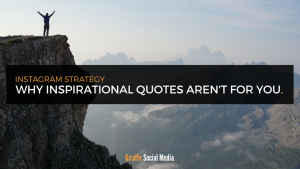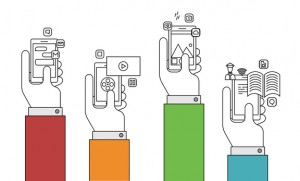One Door improved campaign engagement by meeting their customers where they are.
Cloud-based visual merchandising software company One Door teamed up with B2B marketing platform Influ2 to get more traction in their campaigns. In providing solutions for consumer retailers, One Door’s clients include Best Buy and T-Mobile.
“Our mission is to help retailers transform how they plan, execute and analyze their in-store merchandising and we do this with our cloud based platform called Merchandising Cloud,” said Ken Kuperstein, One Door’s Director of Marketing, at our recent MarTech conference.
According to Kuperstein, his B2B marketing and sales team has 15 to 20 targets at any one account that they need to engage in order to sign a new customer. By transforming their B2B strategy, they were able to take a more successful and efficient approach to reaching these contacts with ad campaigns, as well as follow-up calls.
Wasted media
“Initially we were spending media dollars on account-based ad platforms and were generally getting a high volume of clicks and traffic to our site,” said Kuperstein, “However, the data could not confirm if we were connecting with our personas or really just anyone from a target account.”
He added, “This turned out to be a waste of media dollars. We have spent considerable time building out our database so we knew who we had to target.”
The media budget was also important to sustain over the long haul because of the long sales cycle for B2B prospects, in comparison to shorter cycles in B2C.
“We need to sustain our budget, so we had to find a way to bring prospects into the funnel and stay engaged with them throughout the journey.”
Persona-specific and personalized ads
The One Door team mapped out three to five personas for each buying group, listing their various goals and points. Their first campaign using this strategy used ads tailored to these different personas and driving users to specific landing pages.
They also added some personal elements, like having a name in the personalized headline. These more targeted ads drove click-through-rate as high as 1.1%, up from an previous average of .25%.
Adjusting to different behaviors
But just because they were getting positive responses from prospects who clicked through didn’t mean they’d react to the campaign in the same way.
Throughout the course of the campaign, Kuperstein found different behaviors expressed in how the personas responded.
“Two of our personas are relatively active online and their behavior, in a clicks or downloads, are fairly similar,” he explained. “However, one of our personas, it seems, spends less time online and this has impacted our ability to connect with them.”
In some cases, the persona might be spending less time online — or, they could be spending time online in places that Kuperstein hadn’t originally identified.
Facebook opportunity
Conventional wisdom for Kuperstein and his team was that in terms of B2B social engagement, LinkedIn was the only reasonable platform to engage their audience.
In consulting with Influ2, they were initially skeptical to find out that, of the social ad campaigns the vendor executed for clients, many of them were done on Facebook.
“It wasn’t until a couple of months in, when we started to do a little bit of research, we found that Facebook was actually a key channel for most of our target audience,” said Kuperstein. “And if you think about our personas and where they go to spend their time online, Facebook is still their go-to social channel.”
As a result of pivoting to Facebook, One Door has seen more engagement with their campaign ads. To rise to the occasion, they’ve also improved their own Facebook page and social engagement on the site.
Guiding prospects to the homepage
“As the campaign progressed, we found that downloads and demo requests were trailing off, and we think it was because the creative concept wasn’t broadly understood by our target audience,” said Kuperstein. “The person who’s viewing the ad only has two seconds to look at it. So either they get it or they don’t.”
If they are interested enough to click through, then there is a lot that the landing page can accomplish in further educating the prospect.
“If your page is set up right, you will effectively guide them to a desired action, be it a download or a demo request,” Kuperstein said.
You must learn patience
Kuperstein added, “And now the harsh reality for all of us is that that everyone is not in the market for your product at the same time. When you decide to advertise, you know that when someone is not clicking on it, it doesn’t necessarily mean that something is not working or that the messaging is off. It’s just that they’re not ready.”
This is the other side of the long B2B sales cycle, the cycle when one of your future customers isn’t in the position to buy just yet, but someday will.
Your ad, or your landing page, might have said the right thing, and now this customer will be educated when it comes to be the right time.
See the entire presentation at our recent MarTech conference here (free registration required).
The post Targeting B2B personas in the right channels to optimize campaigns appeared first on MarTech.
MarTech(35)
Report Post






